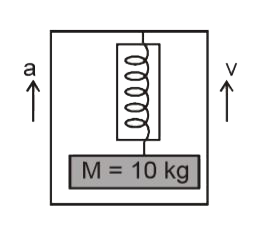A body is suspended on a spring balance in a ship sailing along the equator with a speed v. Show that the scale reading will be very close to W0(1±2ωvg), where ω is the angular speed of the earth and W0 is the reading of spring balance when the ship is at rest. Explain the plus or minus sign
[Hint : W0=mg−mω2R,W=mg−m(mω+v)2R when the ship is moving from west to east]
Step by step video, text & image solution for A body is suspended on a spring balance in a ship sailing along the equator with a speed v. Show that the scale reading will be very close to W_(0)(1 pm (2 omega v)/(g)), where omega is the angular speed of the earth and W_(0) is the reading of spring balance when the ship is at rest. Explain the plus or minus sign [Hint : W_(0)=mg-momega^(2)R,W=mg-m((momega+v)^(2))/(R) when the ship is moving from west to east] by Physics experts to help you in doubts & scoring excellent marks in Class 11 exams.
Updated on:21/07/2023Topper's Solved these Questions
- CENTRIPITAL AND CENTRIFUGAL FORCESBook:NN GHOSHChapter:CENTRIPITAL AND CENTRIFUGAL FORCESExercise:Exercises (A)
Explore 18 Videos
- CALORIMETRYBook:NN GHOSHChapter:CALORIMETRYExercise:All Questions
Explore 28 Videos
- COMPOSITION AND RESOLUTION OF VELOCITIESBook:NN GHOSHChapter:COMPOSITION AND RESOLUTION OF VELOCITIESExercise:Exercise
Explore 25 Videos
Similar Questions
A body suspended on a spring balance in a ship weighs W0 when the ship is at rest. When the ship begins to move along the equator with a speed v, show that the scale reading is very close to W0(1±2ωV/g), where ω is the angular speed of the earth.
View SolutionWhat will be the reading of spring balance in the figure shown in following situations ( g=10m/s2 )

a= 0, v = 0
View Solution
Knowledge Check
A body is suspended on a spring balance in a ship sailing along the equator with a speed v'. If ω is the angular speed of the earth and ω0 is the scale reading when the ship is at rest, the scale reading when the ship is sailing is
Aw0BzeroCW0(1±2wvg)DW0(1−g2w)A body is suspended on a spring balance in a ship sailing along the equator with a speed v'. If ω is the angular speed of the earth and ω0 is the scale reading when the ship is at rest, the scale reading when the ship is sailing is
Aω0BzeroCω0(1±2ωv'g)Dω0(1−g2ω)A body is weighed with a spring balance in a train at rest, shown a weight W. When the train begins to move with a velocity υ around the equator from west to east and if the angular velocity of the train is ω then the weight shown by spring balance is
AWBW(1−2υωg)CW(1−2υωg)DW(1−υ2/R)
A body is suspended from a spring balance kept in a satellite. The reading of the balance is W1 when the satellite goes in an orbit of radius R and is W2 when it goes in an orbit of radius 2R.
View SolutionIf earth suddenly stop rotating , then the weight of an object of mass m at equator will [ ω is angular speed of earth and R is its radius . ]
View SolutionAn object weights W newton on earth. It is suspended from the lower end of a spring balance whose upper end is fixed to the ceiling of a space capsule in a stable orbit around the earth. The reading of the spring balance will be
View SolutionA block of weight W is suspended from a spring balance. The lower surface of the block rests on a weighing mechine. The spring balance reads W1 and the weighing machine reads W2(W,W1,W2 are in the same unit).
View SolutionA weight is suspended from the ceiling of a lift by a spring balance. When the lift is stationary the spring balance reads W . If the lift suddenly falls freely under gravity, the reading on the spring balance will be
View Solution

